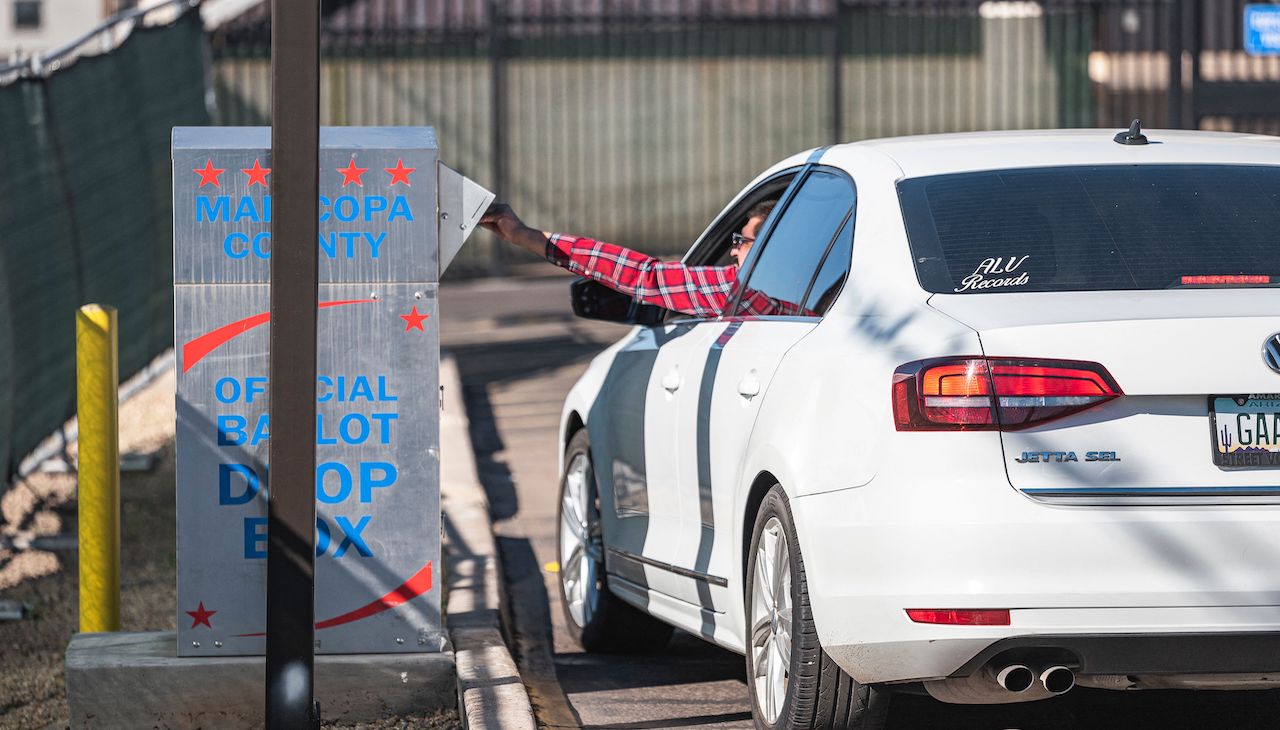
Federal judge rules against Voto Latino, AARA in voter intimidation lawsuit
Clean Elections USA & founder Melody Jennings were found to be within their constitutional rights & ruled them to be no “true threat” to voters in Maricopa Cty.
On Friday, Oct. 28, Arizona Federal Judge Michael T. Liburdi sided with Clean Elections USA and its founder Melody Jennings in a lawsuit filed against them by Voto Latino and the Arizona Alliance for Retired Americans (AARA), alleging voter intimidation.
Judge Liburdi ruled that the right-wing activist group was not a “true threat” and did not show tactics of intimidation. He added that their right to assemble in public spaces is constitutionally protected.
AARA released a statement on the ruling, calling it, “truly disappointing,” and that “American citizens should be able to cast a ballot without fear of personal injury or other harm to their safety and security.”
On Monday, Oct. 24, Voto Latino, and the AARA filed a motion in the U.S. District Court in Arizona seeking a restraining order against grassroots group, Clean Elections USA and its founder Melody Jennings, for alleged voter intimidation.
The two groups argue that on at least five different occasions, the group was surveilling ballot boxes in Maricopa County in addition to intimidating individuals dropping off their ballots. They added that Clean Elections USA was in violation of the Voting Rights Act of 1965 and the Ku Klux Klan Act of 1871 — laws passed to prevent voter intimidation during the Reconstruction and Civil Rights eras.
In the ruling, he said that while “many voters are legitimately alarmed by the observers filming” at ballot boxes in Maricopa County, there was no concrete evidence that the group of individuals had stirred up violent acts nor posted personal information online of those dropping ballots off.
“While this case certainly presents serious questions,” Judge Liburdi wrote, “the court cannot craft an injunction without violating the First Amendment.”
However, Liburdi said the case would remain open and would hear new evidence that the group has “engaged in unlawful voter intimidation.”
Last Wednesday, Oct. 26, during the hearing for the suit, the lawyer for Jennings, Veronica Lucero, argued to Judge Liburdi that “there is no connection” between the activists listed in the suit in Maricopa County and Clean Elections USA. She added that Jennings “has simply advocated that people need to follow the law,” Lucero said.
Those surrounding the ballot boxes with tactical gear and weapons have been described by Jennings as “my people” and “our box watchers” in several social media posts.
Upon learning about the ruling on Friday, Jennings celebrated the results in a post on Truth Social, the social media platform founded by former President Donald Trump.
RELATED CONTENT
“The Constitution won today,” Jennings wrote in the post. “This battle is not over, but today was a step for freedom and for your 1st amendment rights being preserved.”
In the initial motion filed by the two groups, they allege that the intentions of those guarding the ballot boxes was to try and dissuade individuals from voting by way of harassment and threats of violence. But according to Jennings and her grassroots group, she has said that instead they are trying to prevent voter fraud by stationing activists near drop boxes. The organizers say they are there to watch voters and catch them in the act of voter fraud or misconduct.
The motion filed by Voto Latino and AARA asked the court to stop the volunteers from gathering within seeing distance of the drop boxes as they were also allegedly taking photos and recording videos of voters, prospective voters, and/or people assisting them.
Current Arizona law does not allow individuals to remain within 75 feet of ballot boxes or polling places, in addition to being prohibited from making “any attempt to intimidate, coerce, or threaten a person to vote or not vote,” according to Arizona Secretary of State Katie Hobbs. Such behavior includes “aggressive or ostentatious display of weapons” or “directly confronting or questioning voters in a harassing or intimidating manner.”
Allegations of voter intimidation have increased in recent months as we near Election Day, Nov. 8, and even Hobbs has reported at least six complaints of voter intimidation to the U.S. Department of Justice and the state’s attorney general for investigation. These incidents took place at ballot boxes in Phoenix and its nearby suburb of Mesa.
In the ruling, Judge Liburdi also added that another reason he was siding with the defendants was because the two plaintiffs had not been financially impacted from the issues identified in the complaint. It is also important to cite that Judge Liburdi was appointed by Trump back in 2019.
Democratic elections lawyer Marc Elias, representing the plaintiffs, said on Twitter on Friday after the ruling that he planned to appeal the decision.











LEAVE A COMMENT: